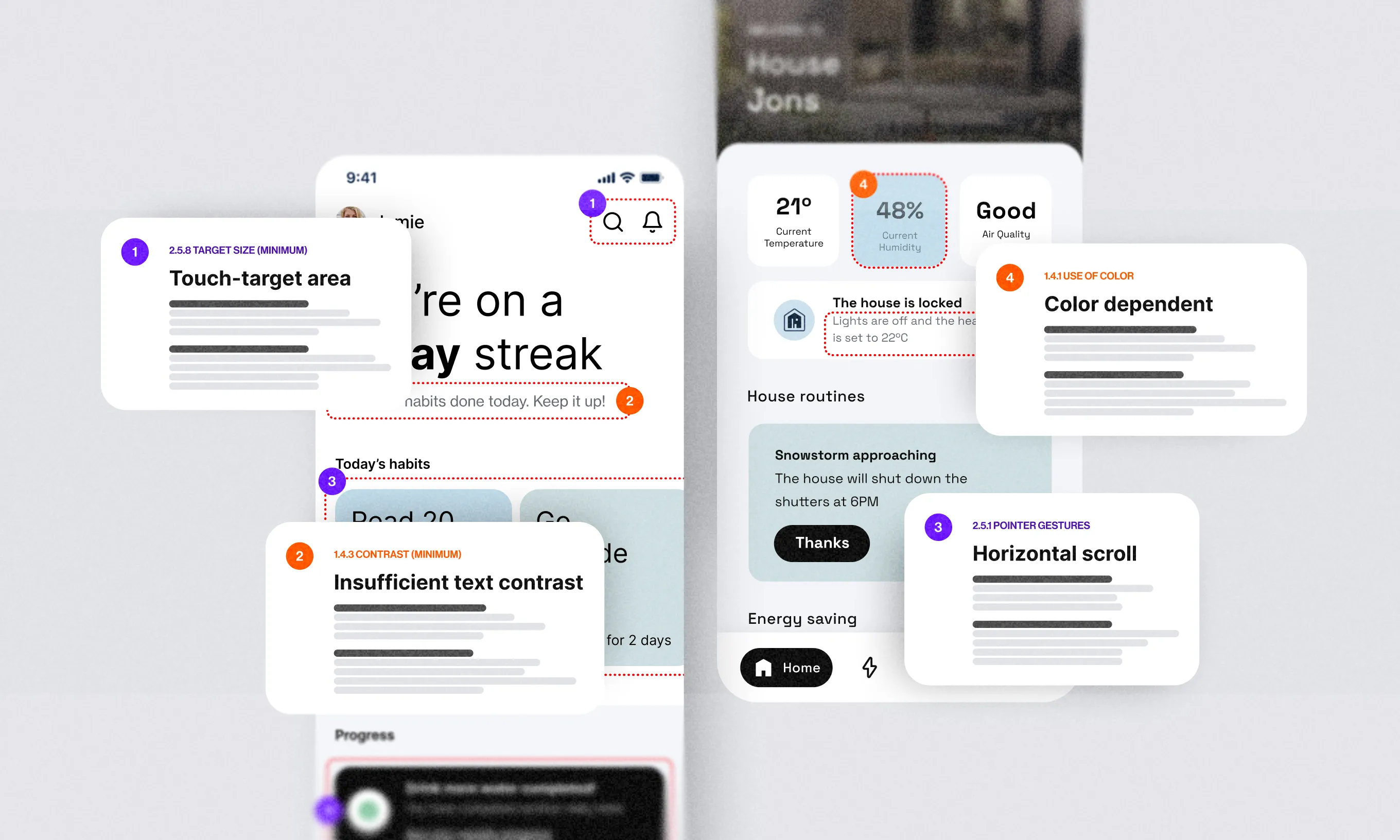Deciding between in-house software development vs outsourcing? We explore the pros and cons of each route to help you make the right decision for your business goals.
Building digital products can be a lengthy and cost-intensive process. If you’re considering starting one and have done the preliminary research, maybe even gone through a couple of agency proposals, the thought may have crossed your mind: “Couldn’t we just do this with an in-house team?
Don’t worry. In the digital product development world, choosing between in-house software development vs outsourcing is a constant dilemma. Like renting versus buying a home, each comes with a set of advantages as well as potential downsides. In a separate article, we focus on the key factors driving this decision, but on this occasion, we’ll examine the pros and cons to help you make an informed decision.
Building digital products with an in-house team
Pros
Domain knowledge
Whatever industry you operate in, your people know its ways. An in-house software development team doesn’t need time to get acquainted with the project because they already know it inside and out. They are familiar with the competition, similar types of products, and the target audience.
Domain knowledge can be especially important for niche software projects, and an outsourcing company may not be able to provide the right level of understanding. For example, suppose you’re producing synthetic sapphire crystals for electronic components and need a custom internal tool to monitor the production process. In that case, you’ll probably sooner build an in-house team than find an agency that is the right fit.
Team cohesion
With in-house development, achieving team alignment is one less thing to worry about. Your in-house team embodies your corporate culture and operational rhythms. They know the internal processes and ways of working, and they know each other. You can find fantastic alignment with an outsourcing company, but with in-house development, you already have it.
Quicker collaboration
When you opt for in-house development, the entire team is under your roof, or if your company works remotely, just a Slack message away. Though we live in a very connected world, well-established communication channels – or live communication, when possible – enable a quicker and more efficient information flow.
Sometimes, the best ideas come spontaneously, and it’s much easier to have an impromptu meeting in-house than with an outsourced team.
Skill development
Investing in in-house development, whether through upskilling or reskilling your internal team, or adding new people to the mix, is a long-term benefit. You’ll have a broader and more diverse set of competencies in-house, which you can use in future projects, too.
Direct oversight
Employing an internal development team allows you to always keep an eye on how things are progressing. With in-house development, you can make real-time adjustments and monitor the process closely, aligning each step with your strategic vision.
Cons
Reduced focus
One of the difficulties with in-house development is that unless you can allow yourself a dedicated team to work on this project and nothing else, people from your organization will likely still be engaged in other activities.
This is especially important for project management/leadership roles. If the project manager holds a similar role in your corporate structure, managing highly responsible organizational tasks on several fronts becomes challenging, if not impossible.
Hiring hurdles
Whether you’re hiring new people full-time or just contracting for this particular in-house development project, it’s a process. Finding the right candidate takes time, effort, and internal resources, and if you add onboarding to the mix, it may take months to get your software development team to full working capacity.
What’s more, to hire tech experts, you need tech experts. You can have the best HR in the world, but how will they assess a candidate’s technical skills in the hiring process?
Overhead costs
When considering in-house software development vs outsourcing, you need to be aware that the costs of a project team amount to much more than salaries. A development team needs equipment to work with; they need digital tools and licenses and a whole suite of hardware and software to aid them in their work.
An outsourced team can actually be a more cost-effective solution because an agency already has all of those additional resources at its disposal. For example, our QA team has an inventory of 200+ devices, including all possible types and brands of smartphones, tablets, and smartwatches. When we test, we test thoroughly.
Smaller tech community
Sometimes, there’s power in numbers. Whatever the size of your in-house development team, it can’t compare to a large tech collective. An outsourced team is usually a part of a company full of tech experts, which means much more support for any individual. Learning is quicker; all the resources are readily available, and there are feedback sessions and mentoring opportunities. And quite simply, when there’s a particularly complex problem to solve, there are more brains to pick.
Retention rate
Finding the right people for in-house development isn’t the only challenge—you also need to know how to keep them, or you’ll find yourself running short on staff mid-project. The tech industry is known for its superb employee benefits, and to keep talented developers on board, you need to create an environment in which they’ll feel content and appreciated.
Will you have enough quality work for them when this project is done? Do you have a structure in place that will allow them to progress in their careers? It’s something to think about.
Building digital products with an external partner
Pros
Industry-agnostic
Sometimes, domain knowledge is useful, but sometimes, it prevents you from seeing the forest for the trees. People who’ve worked in the same industry for years are more susceptible to a bias known as “But this is how we’ve always done things.”
On the other hand, when outsourcing software development to an agency, you can benefit from its breadth of experience across industries. As we’ve witnessed on many projects, a fresh perspective can prove invaluable, and this is another important factor to consider when weighing in-house software development vs outsourcing.
Experience-based efficiency
A digital product development agency probably has hundreds of successful projects under its belt. We’ve seen projects big and small, complex and demanding, simple and straightforward. We’ve done immeasurable amounts of user research for all imaginable types of products.
This extensive experience allows us to make better decisions more quickly. We can recognize where potential dangers lie and plan ahead, and we can recommend a course of action when you’re faced with a dilemma because chances are we’ve seen it before.
End-to-end solution
It depends on the type of product you’re planning to build and what kind of specialized skills you already have at your disposal, but we can tell you what type we have—all of them. From product strategy to design, development, and data analytics, we cover the entire software development process. We also have a very versatile tech stack and are skilled in emerging technologies like ML, AI, and IoT.
A tailored outsourced team
Because an agency has all those differently skilled experts available, it’s easy to put together a custom development team with specialized skills suited to your project’s needs. You have an in-house design team but no QA engineers? No problem; we can supply those. You need two Android developers and three iOS developers for your mobile app? We’ve got you covered.
Team scaling flexibility
Adaptability is key for the modern software development process. The project scope may change mid-course, and an outsourcing company has the necessary flexibility to support that. In an agency setting, it’s much easier to scale the development team up or down or add new members to support changing project requirements like a different platform or technology.
Cons
Quality concerns
Questioning the quality of your outsourcing partner is a legitimate concern. Just like in any profession, anyone can claim that they’re the best, but few actually are.
When outsourcing software development, choosing the right partner is a leap of faith. However, rather than giving up before even trying, do some research to put your mind at ease. Check whether the company holds relevant certifications, find client reviews, review their previous project work, and check out app stores to see their products’ scores.
Integration challenges
It can be challenging to find an outsourcing partner who has the required technical expertise and can seamlessly integrate with your team. Potentially, there will be cultural differences and language barriers, variations in working methods, and maybe even a time difference to struggle with.
Before you decide in favor of in-house development, focus on finding a partner who is the right fit – both in terms of technical and soft skills. When you have, the integration won’t be that much of a challenge, and those teams will merge like two software modules in a well-architected application.
Changes in the project team
A common concern with an outsourcing partner is that project teams often change during the development process, and it is another perfectly legitimate one. An agency juggles many plates, and sometimes, moving people from one project to another is necessary.
We can’t speak for other agencies, but we can say for ourselves that if this happens, there are onboarding and offboarding processes and mechanisms in place to ensure that any changes in staff are seamless and that a project’s success is never jeopardized.
Level of investment in the project
You may feel that an outsourcing team will never be as dedicated to the project as your people are. It’s only logical – an in-house team is invested in the project’s success because it will bring benefits for the company, ergo, benefits for them.
However, when we enter a partnership, your project becomes our project, and we share a common goal. We want you to succeed because that means we’ve also succeeded.
Less direct control over the project
When you outsource, the project is no longer under your roof. You may be unable to micromanage every aspect, check in on your developers to see what they’re working on at a given moment, or call those impromptu meetings.
However, when you work with an agency, you don’t give away control over the project; you delegate it to a competent partner who knows what to do. Maybe you won’t be as involved in day-to-day operations as you would be with in-house development, but you’ll still have full visibility of what is going on. We manage all our projects in Productive, and you can monitor how your product is progressing and what’s going on with the budget at all times.
The verdict on in-house software development vs outsourcing?
When you set out to build your digital product, choosing between in-house software development vs outsourcing is an important step that will shape the journey ahead. To make an informed decision, you should carefully weigh the pros and cons but also think about the deeper nuances of your project goals.
There is no one-size-fits-all solution, but we hope we managed to shed some light on the factors to consider when making this choice.
If you still have concerns about leaving your million-dollar idea in the hands of an external development team, let us know what they are. Maybe we can help you put your mind at ease.










